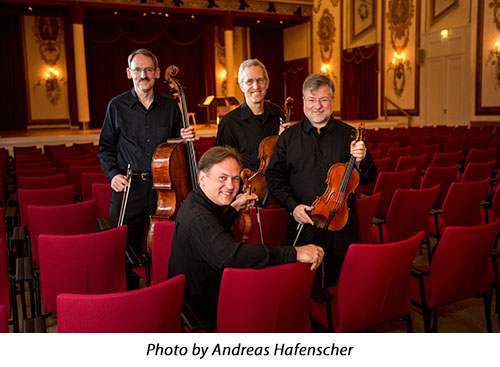
A legendary string quartet known for playing beautiful music together showed that they play just as well with others as the 38th annual Chesapeake Chamber Music Festival opened with a resounding bang, featuring not only chamber gems from the 18th and 19th centuries but also a jazz-like nugget written by a composer born in 1983.
Orion String Quartet, having announced that the upcoming 2023-24 season will be its last, was the guest-star attraction for the “Festival Opening Extravaganza!” The chamber festival’s co-artistic directors, violist Catherine Cho and cellist Marcy Rosen, were joined by Orion’s violinist brothers Daniel and Todd Phillips, violist Steven Tanenbom and cellist Timothy Eddy to perform Brahms’ String Sextet No. 2 in G Major, Opus 36 for a dramatic opening night finale.
Orion’s foursome, which has essentially been the “house band” of the Chamber Music Society at Lincoln Center since 1997, will perform its farewell concert next April at CMS’s Alice Tully Hall home base. Named for the eponymous constellation – Orion has performed practically all the worthy chamber music repertoire since its debut in 1987, including Bartok’s modern String Quartet No. 6 which they will play Sunday on the Ebenezer Theater stage.
The evening got off to a comfortably familiar start with Mozart’s Piano Quartet No. 1 in G Minor, K. 478. Commissioned to write three piano quartets, the last two were canceled because the first was poorly received as it was considered too difficult to play and, perhaps, too challenging for listeners. Now, more than two centuries later, it is considered the first great piano quartet by any composer.
The first movement opens with a booming G-minor clarion call that quickly gives way to a gentle theme in a closely related key – B-flat. This signals a harmonic flux throughout the piece, managed with nimble skill by pianist Robert McDonald. His piano-led change of pace in the second-movement Adante introduces an introspective response by violinist Randall Goosby and violist Natalie Loughran with a tinge of regret in soft undertones by cellist Rosen. But the party mood resumes in the closing Rondo with conversational interplay between cello and violin/viola counterparts.
Next, for something completely different: “Cities of Air” for Flute and String Quartet by 40-year-old Paul Wiancko who also plays cello for Kronos Quartet, known for innovative musical choices. Commissioned by New Mexico’s Music from Angel Fire, the 10-minute piece had to wait a year or so for its debut, due to COVID shutdowns of live performances of everything from ballet to baseball. Tara Helen O’Connor’s flute sings like a bird in the opening notes that settle into more grounded string accompaniment before breaking out into a musical riot of each instrument seemingly on its own – violinists Goosby and Orion’s Daniel Phillips, violist Loughran and cellist Rosen – before concluding with a dreamy disposition while letting out the air, literally, of the flute.
Post-intermission was the Brahms sextet, which famously includes a reference only a musician or music scholar is likely to notice. A woman named Agathe, to whom Johannes was briefly engaged, has her name partially spelled out in consecutive notes, A-G-A-H-E.
The sonata-form first movement with a haunting sound emitted by first violist Tenenbom builds to crisis proportions by the other strings before yielding to the elegant main theme introduced by first violinist Daniel Phillips and repeated by first cellist Eddy. Emotional turmoil marks the second movement with violins (notably that of Todd Phillips) and violas (Cho’s) cry out separately as Rosen’s cello marks the time with minute-hand plucking.
The third-movement Adagio suggests a trance-like state of mind interrupted by an assertive cello duet. A contrapuntal exchange among the violin and viola pairs swells to an inspired melodic resolution of sheer beauty by Orion Quartet and two of the festival’s finest. While still emoting drama tempered by a soothing refrain, the final movement begins and ends with satisfying optimism, as does the evening.
Judging from opening night, this festival – themed as “Cultural Crossings” – is a musical must.
Steve Parks is a retired New York arts critic now living in Easton.
Chesapeake Chamber Music Festival
Six concerts through June 17, with a free open rehearsal,10 a.m. June 14, at the Ebenezer Theater, 17 S. Washington St., Easton. chesapeakemusic.org

